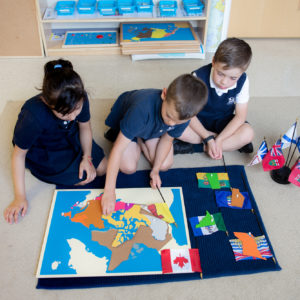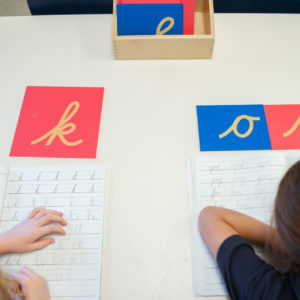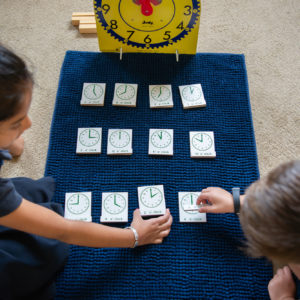At Stirling, we are pleased to offer Junior (Grades 1 – 3) and Senior (Grades 4 – 6) Elementary programs in spacious, bright, and well-equipped classrooms, led by experienced and dedicated teachers. Our Montessori classrooms form vibrant communities where children uncover their learning potential and receive ongoing, personalized support for their academic, social, and emotional development.
Our Montessori materials facilitate open-ended exploration, allowing children to grow according to their unique abilities and skills. The multi-age classrooms foster broad social development and elevated learning, promoting cooperative methods that encourage peer teaching and social interaction. Our teachers are dedicated to meeting the developmental needs and learning styles of each child, employing small group or individualized instruction to promote growth at a personalized pace in a non-competitive atmosphere. Elementary students actively pursue a shared set of skills, encompassing collaboration, creativity, leadership, and academic excellence. As concepts are mastered, new ones are seamlessly introduced into the children’s educational journey.
Stirling stands out for our extensive French program (featuring daily French lessons), an interactive STEM component, and diverse gym classes that include swimming, soccer, tennis, and yoga. To enrich in-class learning, we organize field trips each term, while our after-school clubs, led by Stirling staff, provide students with opportunities to engage in activities of personal interest beyond the traditional classroom setting.
Junior Elementary (Grades 1 – 3)
At Stirling, the Junior Elementary program and curriculum build upon the foundational principles introduced in the Casa program. Key areas of focus include Mathematics, Language, History, Botany, Zoology, Geography, and Science. In this developmental stage, children are captivated by the “how” and “why” of their surroundings. Junior Elementary students are now delving into the mysteries of the Universe, seeking to comprehend their role within it. This phase marks the onset of imaginative thinking, reasoning, socialization, and moral understanding.
Montessori education cultivates thinking skills rather than mere memorization of facts. Utilizing hands-on materials, students are encouraged to explore and actively participate in the learning journey. Stirling’s learning environment supports both individual and group work, empowering students to pursue their unique interests and passions under the guidance of the teacher.
Junior Elementary Program:
- Learn to set and achieve individual goals
- Develop the ability to independently plan and organize activities
- Freedom to work in the classroom fosters a sense of responsibility
- Expected responsibilities contribute to the development of strong self-esteem
- Cultivates inner discipline that extends throughout the child’s lifelong learning
Senior Elementary (Grades 4 – 6)
The Senior Elementary program at Stirling stands out due to its exceptional teacher-to-student ratio, facilitating personalized instruction. Aligned with and surpassing the Ministry of Education standards, Stirling’s enriched curriculum features a daily French class, music education, athletics, and a robust emphasis on STEM and technology.
Our comprehensive lessons span Mathematics, Language (covering writing and grammar), History, Geography, Zoology, Botany, and Science. Over the three-year Senior Program, students not only acquire academic proficiency but also develop confidence, self-esteem, independence, and a global awareness that forms a solid foundation for lifelong academic success.
Beyond honing strong academic skills, our Senior Elementary program cultivates creativity and confidence, providing numerous opportunities for leadership development.
Senior Elementary Program:
- Focuses on knowledge acquisition
- Inspires students to think critically, question, and apply skills in real-world contexts through inquiry, innovation, and integration
- Encourages engaged citizenship, fostering leadership and collaboration skills
- Develops environmental stewardship, instilling a global perspective on sustainability and world issues
Curriculum
Language
The Montessori Language curriculum enhances students’ skills in reading, spelling, comprehension, writing, creative writing, grammar, sentence analysis, literature, poetry, and verbal communication. Students engage with a variety of literature and poetry, studying word families, word origins, and their meanings. Handwriting skills are reinforced through practice, journaling and class work.
Mathematics:
Through a “hands-on” approach, children actively discover new concepts, followed by memorization of facts. Concrete learning materials facilitate children in moving towards the process of abstraction with greater ease. The Mathematics curriculum integrates facts, arithmetic, graphs, fractions, proportions, word problems, rounding, averaging, statistics, algebra, and geometry.
History:
In History, students actively explore the concept of time and culture. The curriculum encompasses the creation of the Universe and the formation of the Solar System, the timeline of the Earth, evolution of humans, and the timeline from prehistory to current history.
Geography (including Earth studies and Science):
Children explore physical geography and Earth systems (such as water cycles, formation of mountains, tectonic plates, movements of continents, etc.). We delve into political, cultural, and economic geography, and children discover how the physical changes of our Earth (droughts, climate changes, weather patterns) affect each. Additionally, children learn about atoms and molecules, scientific concepts, and many fascinating facts.
Biology (including Botany and Zoology):
The Biology curriculum provides children with a means of classification. Students explore life systems, such as the human body, respiratory, circulatory, nervous, and digestive systems, as well as cell structure and function. They examine the classification of plants, including their structures and roles, and delve into the classification system of the animal kingdom, studying animal physiology and the functions of internal organs. Students also investigate how animals adapt to their surroundings.
Experiments:
Children formulate hypotheses and learn to verify or nullify them through a series of experiments in Geography and Biology.
Physical Education:
Children actively engage in physical activities, games, and sports designed to promote physical fitness, develop motor skills, and encourage teamwork in a non-competitive atmosphere.
Going Out:
We visit local parks, tennis courts, community centres, Milton Arts Centre, and local farms.






